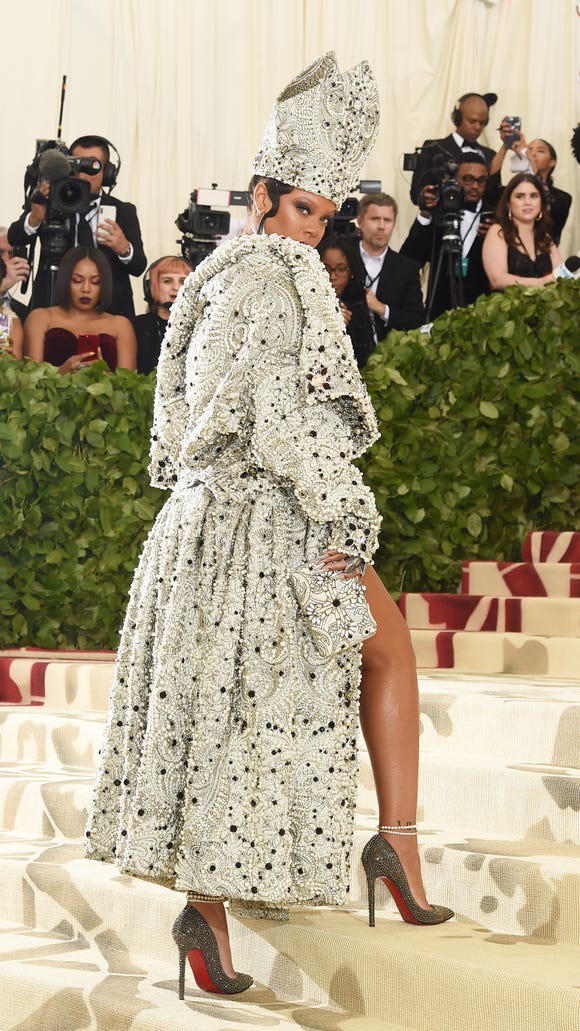The Met Gala’s Evolution & Its Impact On Luxury Fashion Retail9 min read
Table of Contents
The Met Gala, referred to as the fashion world’s Oscar Night, goes beyond dollars raised and social media impressions made. It’s a grand display of art as fashion and fashion as art, showing how both forms comprise and define our cultural fabric. And the biggest impact of the Met Gala is visible on the luxury fashion business.
Each year, the theme is chosen with the utmost consideration—what story does this tell? What history does it teach? How will it impact the fashion industry in the time to come?
And in 2021, the theme ‘In America: A Lexicon of Fashion’ has been chosen with care. With American designers at the forefront of conversations around diversity, inclusivity, sustainability, gender fluidity, and body positivity, the framework of the show enables the community to focus on younger designers who are engaging thoughtfully and deeply with those ideas.
The annual exhibit that’s hosted for the benefit of the New York-based Metropolitan Museum of Art’s Costume Institute, is one of the biggest events of the fashion calendar. While the Oscars, Grammys, Globes and umpteen fashion shows are alluring as well, the Met Gala has an air of mystery that envelops it like no other. Nothing can match the extravagance of this event, which some call it ‘the party of the year’ and ‘the Oscars of the East Coast’.
The enigma of this exclusive affair can be narrowed down to three factors – the carefully curated themes, manicured guest list, and how it is not televised beyond the red carpet. What happens after the red carpet isn’t available for the general public to consume. Yes, we get to see the glimpses. Like the time when Kylie Jenner broke the ‘no social media’ rule with her bathroom selfie during the 2017 Met Gala and others broke the ‘no smoking rule’. Or the Taylor Swift-Tom Hiddleston dance off in 2016. But the gala is out of bounds. Yet, the red carpet coverage manages to demonstrate the extremity and eccentricity in its full glory.
From Fundraising to Fashion
Being tied with art and costume, it always celebrated fashion. However, the Met Gala and the fashion industry developed a close-knit partnership over the years. The credit goes to the women that made it what it is now. American fashion publicist Eleanor Lambert, columnist & former Vogue editor-in-chief Diana Vreeland and present Vogue editor-in-chief Anna Wintour are the brains and heart behind this evolution.
Lambert is credited for putting American fashion and New York on the map. She founded the charity ball in 1948 to support the Costume Institute. The gala went from being one of the many events around that time to becoming the most glamorous one soon after Vogue came into the picture with Vreeland taking the reins in 1972. Needless to say, with the entry of the legendary Anna Wintour in 1995, Vogue’s role became even more instrumental in transforming the gala and making it the ‘it’ thing.
Wintour made it exclusive and chic by closely monitoring the guest list and hiking up the ticket prices. Her list included the biggest and the most unexpected names. For instance, the first member of the British royal family to attend a Met Gala was Princess Diana in 1996; a year after Wintour became a chair of the event. The fashionable Olsen twins – Mary-Kate and Ashley, attended their first Met Gala in 2005, a year before they launched their label ‘The Row’ and became a prominent name in the luxury fashion circle.
Under her watch, the Met Gala evolved beyond its charity status and became the highly anticipated annual soiree that it is now.
When asked to describe how the gala has changed over the years, Wintour said, “I was very honoured when they first asked me to become involved because there was such a tradition of Vogue always supporting the Met…. I think obviously we have opened it up to maybe a larger world than the society world that it was when Mrs. Vreeland was there. It was more society and fashion, and we broadened that.”
So how has the scope of the Met Gala broadened, what really goes behind the curtains of the Metropolitan Museum of Art and how it impacts the fashion industry?
Representing Society Through Themes
The fashion police haven’t stopped raving about Rihanna Met Gala look when she came dressed as Pope. Her pearl and jewel studded robe with a matching necklace emerged as the best look of the Heavenly Bodies: Fashion and the Catholic Imagination-themed ball.

However, it is not all rainbows and butterflies when it comes to pulling off an event this size, considering the magnitude of the challenge. A ton of effort went behind finalizing the theme and getting the art installations as well as the collection ready. The approval of the Vatican was crucial to realizing this theme. It took many years of negotiations, a few failed attempts and multiple visits to the Vatican before Andrew Bolton, the present head curator of the museum secured the permission to borrow the vestments.
One would think that the struggle would cease to exist after the approval. But the Heavenly Bodies’ red carpet sparked a debate on culture appropriation of Catholic culture. From the length of Rihanna’s skirt to the use of Catholic symbols without its context and meaning, the post-event analysis of the fundraiser explored the culture appropriation angle raised by a section of people. Important thing to remember is that the Vatican had approved the gala, the use of catholic symbols and more than 40 precious vestments that belonged to Sistine Chapel Sacristy.
Through its myriads of themes, the Met Gala has always tried to represent the present and take fashion forward. In these times, when the industry and consumers are trying to understand the various layers of cultural appropriation and appreciation, Met Gala presented a unique platform to the debaters through its Heavenly Bodies red carpet looks– the ones for it and the ones against it.
The theme ‘Camp: Notes on Fashion’ for instance, was inspired by Susan Sontag’s essay published in 1964, and it was all about about celebrating differences and challenging rigid ideas.
“For many years fashion curators, myself included, were too apologetic in their approach. Fashion is so connected to the body and issues of identity they cannot be separated. It’s my responsibility to challenge people’s preconceived ideas about a subject and the medium of clothing… People have a definite idea of what camp is – that it’s superficial, about gay men and transvestites. And it is that, but it’s many other things too,” Bolton explained.
The theme of the exhibition also determines how far the team can stretch the guest list. Since, it is a by-invitation-only ticketed event, Wintour instructs her team to be meticulous about adding & removing names.
She explained the connection between the theme of the exhibition and the guest-list curating process by disclosing that the guest list of 2017 Rei Kawakubo/Comme des Garçons: Art of the In-Between was small because the Japanese designer Kawakubo is a very private person. On the other hand, 2013 Punk: Chaos to Couture enabled them to invite a lot more people as it fit the mood of the theme.
Revenue, Growth and the Global Fashion Industry
The biggest impact of the Met Gala is visible on the luxury fashion business. Right from predicting a potential global market to effectively generating revenue from a non-commercialized event, the Oscars of the East Coast is a boon to the fashion industry.
Case in point: 2015’s China: Through the Looking Glass Met Gala. It explored the influence of Chinese motifs, costumes, art, paintings and other creative pieces of work on Western fashion. It was an ode to China and its contribution to the fashion world. This theme too led to the culture appropriation debate, much like the Heavenly Bodies: Fashion and the Catholic Imagination. But a positive outcome of this exhibition was the focus on China’s yet-to-be-explored luxury retail market.
In the last five years, the Chinese luxury goods market has grown exponentially and experts predict that the country would replace US to become the world’s largest fashion market. The country has opened its doors for global luxury brands and there has been a steady increase in the percentage of aspirational spendthrift millennial buyers. Andrew Wu, LVMH group president of Greater China also has warned that China’s luxury market shouldn’t be underestimated.
The growth of a country’s fashion industry can’t be pinned down to one event, but it would be safe to assume that Met Gala’s China exhibition was definitely an indicator of the days to come.
Moving on to the commercials, as mentioned before, the Met Gala isn’t a televised event. Oscars and Super Bowl make their money through commercials, sponsors, broadcasting rights and other means. But the drama and opulence of the fundraising show is on full display only till the red carpet. Yet, it is one of the most expensive shows.
Money exchanges hands, yes. But not in the conventional commercialized way.
Actress Blake Lively wore jewels worth $2 million at last year’s gala. Celebrities and designers are usually tight-lipped about the cost of the dresses worn/made by them. But if we consider the labour that goes into making these clothes (Rihanna’s Pope outfit took 250 hours to sew and 500 hours for embroidering), it is not hard to guess that they must cost a small fortune.
A single ticket to gain entry is priced at $30,000. And if one wants to book the entire table then the charge on the card would be $275,000. The proceeds, of course, go to the Costume Institute. But it is not wrong to wonder what’s in it for brands and designers.
According to industry experts, the event helps brands to stay relevant and connect with their buyers in the most genuine way. And for that, they are more than willing to spend thousands and millions of dollars, if needed.
“Brands are struggling to connect. They’re looking for authentic ways to remain relevant as they compete with pop culture to win the mind, heart and hands of their consumers. It’s (Met Gala) the pinnacle of art, fashion and culture. It’s the who’s who guest list for brands. If your brand plays in this space, you can’t afford not to take part,” reasoned Andrew Wu, co-founder of Intercept Group.
Celebrities from all walks of life participate in the Gala, provided they make it to Wintour’s guest list. The exclusivity is maintained by not only setting a steep price of admission but also by reserving right to admission.
In an over exposed and easily accessible commercialized world, the Met Gala stands out as a place that is fashionable, private, and relevant. Therefore, the brands that make it to the ramp enjoy undivided attention.

